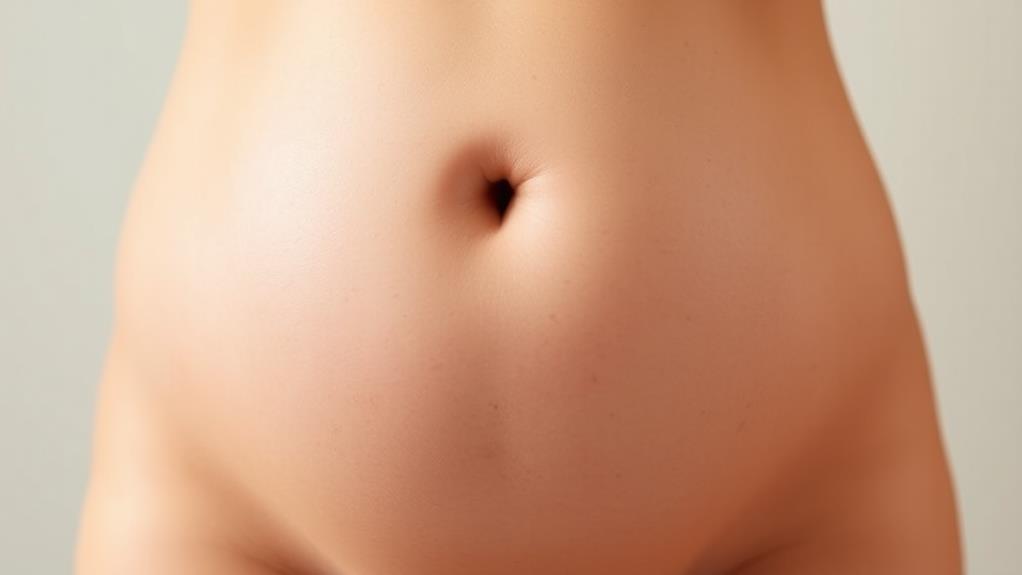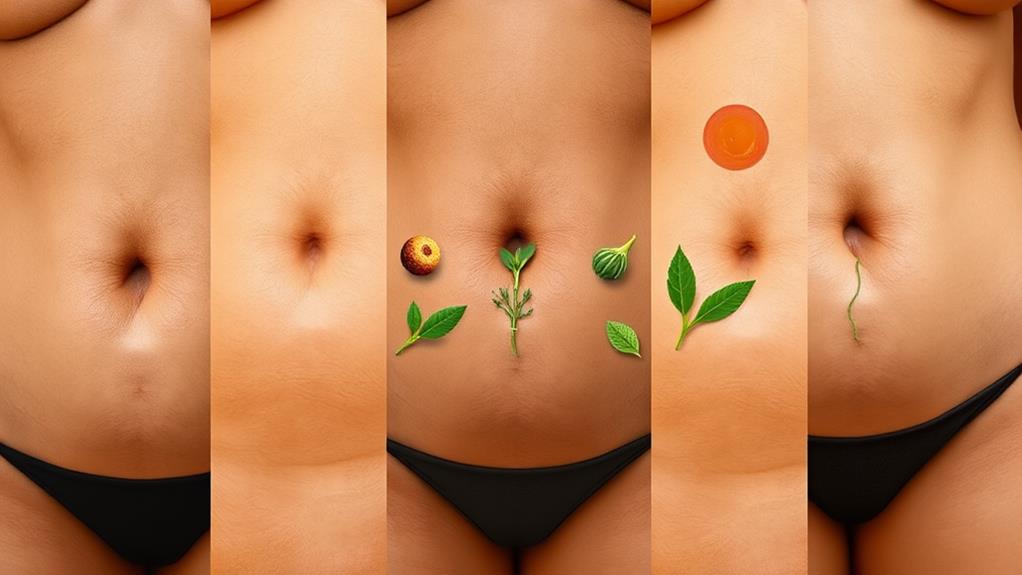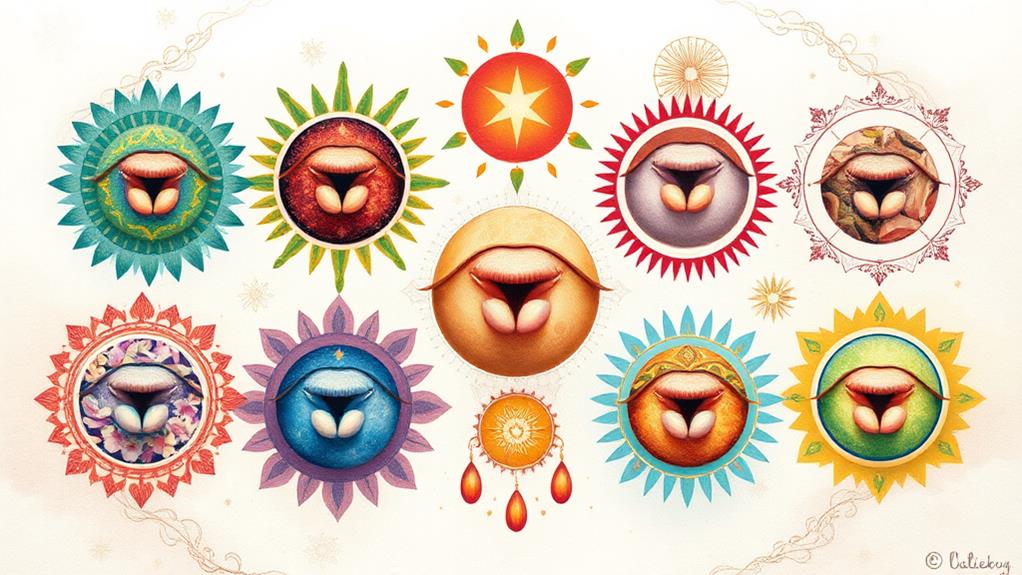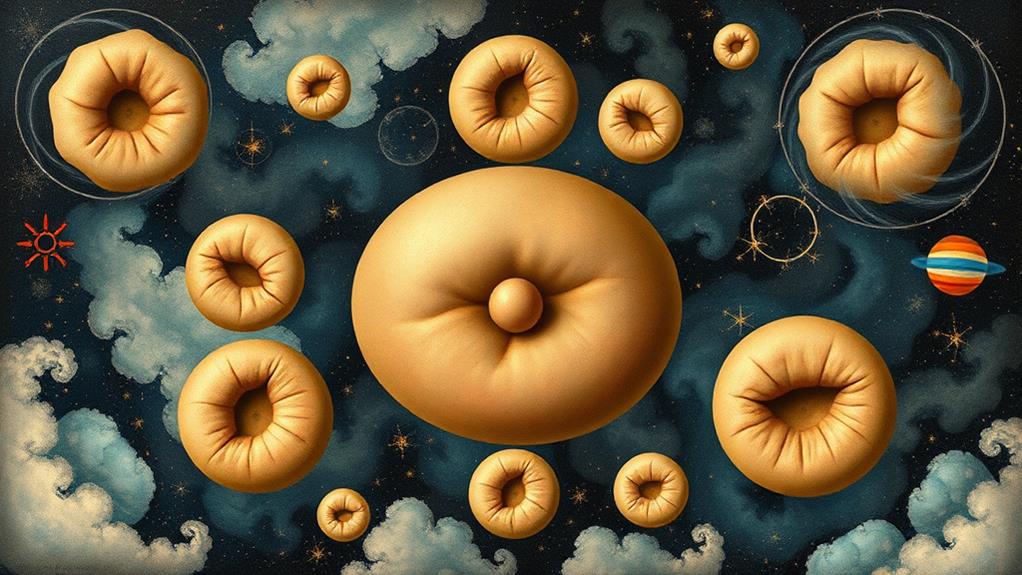You might not think much about your navel, but its shape can reveal important information about your health. For instance, a protruding "outie" could indicate an umbilical hernia, while a deep belly button might suggest excess abdominal fat. It's crucial to pay attention to any changes in your navel's appearance, as they could signal underlying health issues. But is there more to your navel shape than just physical indicators? Some intriguing theories link it to genetics and even personality traits. What else could your navel be telling you?
Anatomy of the Navel

Understanding the anatomy of the navel, or umbilicus, reveals its significance beyond just being a scar from the umbilical cord. This little area on your skin was once a vital connection between you and your mom. The umbilical cord brought nutrients and oxygen to you while you were in her belly, and when it was cut, it left behind that unique mark we call the navel.
Inside your navel, there are three blood vessels—one umbilical vein and two arteries. The vein delivered oxygen-rich blood to you, while the arteries took away the blood that needed cleaning. Isn't that fascinating?
Now, did you know that the navel can be sensitive? It has lots of nerve endings, which can make it ticklish or even feel good when touched.
But here's the deal: you've got to keep your navel clean! Regular cleaning helps prevent infections and keeps your skin healthy. If debris builds up, it can lead to conditions like omphaloliths, which sounds fancy but isn't fun at all.
Historical Insights on Navel Shape
Throughout history, people have looked at navel shape with intrigue, often linking it to personality traits and health. Ancient Chinese mythology even suggested that different shapes could reveal character qualities.
For example, if you'd a protruding navel, people might think you were resilient and extroverted. This was sometimes linked to umbilical hernias in babies, which made it a topic of discussion when you grew up.
On the flip side, a shaded navel was seen as a sign of modesty and reserved behavior. You might be the type who keeps personal issues private. Isn't it funny how something so small can say so much about you?
German psychologist Gerhard Reibmann wrote a book exploring navel shape and life expectancy, but let's be honest, these claims aren't scientifically backed.
Nonetheless, you might find it cool that research showed the slim navel is the most common type, often linked to self-assurance and emotional stability.
Health Indicators From Navel Shape

Examining your navel shape can provide surprising insights into your health. You mightn't think much about your belly button, but its shape can reveal important health indicators.
For example, if you have an outie belly button, it could suggest an umbilical hernia, especially in infants or pregnant individuals. That's a fancy way of saying there's a little bump that needs checking out!
On the other hand, a deep or shaded navel can hint at excess abdominal fat, which could raise your risk for obesity-related medical conditions. Most people have an innie belly button, which usually means everything healed nicely after birth.
But if you notice unusual shapes or changes, like bulging or discoloration, it might signal something serious, like infections or even cysts.
Regularly keeping an eye on your navel can lead to health benefits. Make sure to check for cleanliness and any changes.
Hygiene and Infection Risks
A clean belly button is essential for preventing infections and maintaining overall hygiene. You mightn't think about it often, but your belly button can collect dirt and debris like a tiny vacuum! Regular cleaning with mild soap and water keeps it fresh and healthy.
If you ignore your belly button, you could face unpleasant symptoms like redness, swelling, or even discharge. Yikes! These signs may mean that pesky pathogens, like fungi, yeast, or bacteria, are having a party in your navel.
Also, moisture can be a big problem, especially if you're sweating or wearing tight clothes. That wet environment can help fungi grow, leading to infections. Keeping the area dry is key.
And don't forget, if you neglect hygiene, you might end up with something called umbilical stones, which sounds way cooler than it is! You might even need a doctor to remove those.
Proper hygiene is especially important for little ones. Newborns are at risk for omphalitis, a serious infection around the umbilical cord.
Navel Shapes and Personality Traits

Your belly button isn't just a spot that needs cleaning; it might reveal insights about your personality too! Isn't that wild?
If you have a protruding navel, it could mean you're resilient and optimistic. People with this shape often have an average life expectancy of 72 years, showing they bounce back from challenges.
On the other hand, shaded navels, commonly seen in those with excess abdominal fat, suggest a modest and compassionate personality. These folks are typically calm and might live up to 81 years!
Now, if your belly button is slim and aesthetically pleasing, you might be self-assured and generous, living around 75 years on average.
Horizontal navels, which spread sideways, indicate complex emotions and lead to a life expectancy of 68 years.
Complications Linked to Navel Issues
When it comes to navel health, complications can arise that may surprise you. Your belly button might seem like just a tiny feature, but it can actually signal bigger issues.
For instance, when the umbilical cord is severed at birth, some might develop an umbilical hernia. This happens when a weak spot in the abdominal wall lets internal organs poke through, causing pain if it's not addressed. Yikes!
You should also keep an eye on the skin around your belly button. If you notice redness, swelling, or any unusual discharge, it could mean there's an infection, like omphalitis.
In serious cases, this can lead to sepsis, especially in little ones. Debris can collect in your navel, forming hard lumps called omphaloliths, which might need a doctor's help to remove.
If you're feeling persistent pain or see a bulge near your belly button, it's time to consult a healthcare provider. These could be signs of serious conditions like ascites or incisional hernias.
Cultural Perceptions of the Navel

Exploring the cultural perceptions of the navel reveals its rich symbolism and significance across various societies. Your belly button, that little spot on your tummy, has a lot more meaning than you might think! In many cultures, it symbolizes the connection between life and birth.
People see their navels as a sign of beauty and often adorn them with jewelry or body art, turning these simple spots into expressions of personal style.
Some health beliefs also surround the navel. For instance, in certain cultures, the shape and cleanliness of your belly button are linked to your overall health. So, keeping it clean might just be more important than you thought!
On the flip side, there's even a thing called omphalophobia, which is a fancy term for the fear of belly buttons. Can you imagine being scared of your own navel?
Historically, cultures like the Chinese even believed that the shape of your navel could reveal personality traits or fate.
Isn't it fascinating how something so small can hold such cultural significance? Your belly button might just be a little window into a world of beliefs!
Changes During Pregnancy
You may also see some skin discoloration around the belly button. This darkening happens because of hormonal changes, which are common during pregnancy.
Plus, your belly button area might feel more sensitive than usual, so be gentle when touching it.
The changes during pregnancy can make your belly button wider, shorter, or even less vertical.
After giving birth, some women find their belly button shape goes back to normal, while others notice it stays a bit altered.
It's all part of the journey! So, while your belly button might be a little different, it's just another reminder of the amazing changes your body went through to welcome a new life.
Embrace it, and remember, every belly button has its own story!
Myths Surrounding Belly Button Shapes

What do you really know about the myths surrounding belly button shapes? You might've heard that having an "innie" or "outie" can say something about your health or even your personality.
But guess what? Those claims are just myths! There's no scientific evidence that links your belly button shape to your life expectancy or character traits.
Some cultures, like those influenced by Chinese mythology, have their own beliefs about navel shapes, but those interpretations aren't backed by science either.
Even a German psychologist wrote a book suggesting connections between a T-type belly button and personal qualities, but those ideas remain controversial and unproven.
It's fun to hear stories about how the shape around the navel could influence your temperament or resilience, but don't take them too seriously.
These myths might make for interesting conversation, but they won't help you understand your health.
So, the next time someone tries to tell you what your belly button says about you, smile and remind them that science has the last word on this one!
Just embrace your unique belly button shape—myths and all!
